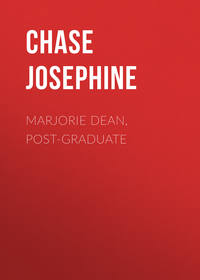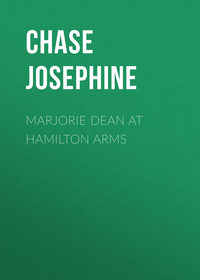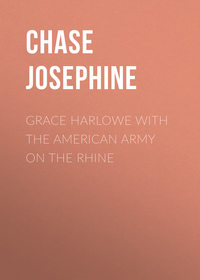 полная версия
полная версияMarjorie Dean, High School Sophomore
"Listen to me, girls," she began earnestly. "We mustn't say a word to our opponents before the game. I know I just said that we ought to have an understanding, and I meant it. But we had better wait until the end of the first half. If everything is all right, then so much the better. If it isn't – well – we shall at least have given them their chance."
The players lingered in the Hardings' living room to discuss the coming contest, go over their signals and prepare themselves as effectually as possible for the fray. It was almost noon when Marjorie sped up the stairs to her room, there to put into execution the search she had decided to make. Mary's letters to her, tied with a bit of blue ribbon, reposed in a pretty lacquered box designed especially to hold them. Marjorie untied the ribbon and fingered them with a sigh of regret for the happy past. Most of them were written on white paper, a few were on pale blue, Mary's color. Almost at the bottom of the box was one gray envelope. The searcher drew a quick breath as she separated it from its fellows. Drawing the envelope from her blouse, she compared the two. They were identical. The mysterious warning was no longer a mystery to her.
CHAPTER XIX
A BOLD STAND FOR HONOR
Thrilled with the discovery she had just made, Marjorie's first impulse was to seek admittance to the room so long denied her and confront Mary with the knowledge of her good deed. Remembering her General's injunction, "Let her alone," she refrained from yielding to that impulse. Her pride, too, asserted itself. It was not her place to make advances, all too likely to be rebuffed. No, she must keep her secret until time had done its perfect work. Reconciliation lay in Mary's hands, not hers. She decided, however, that the girls must never know who had been the author of the warning. So far as she was concerned, it must remain a mystery to them.
"Where is Mary?" she inquired of her mother, as they sat down to luncheon a little later. Mary's place at the table was vacant.
"Oh, she was invited to luncheon at her friend Mignon's home," returned Mrs. Dean, frowning slightly. "I suppose she is hoping that Mignon's team will win the game this afternoon."
"I suppose so," returned Marjorie absently. Her mind was still on her discovery. Should she tell Captain about it? Perhaps it would be best. Briefly she acquainted her mother with what she had so recently found out.
"I am not greatly surprised," was her mother's quiet comment. "Mary is too good a girl at heart to persist for long in this ridiculous stand she has taken. I am glad you said nothing of it to her. She must clear her own path of the briars she has sown. When she does, she will have learned a much-needed lesson."
"But, Captain, it's dreadful to think of Christmas coming and Mary and – I – not – friends," faltered Marjorie. "I can't give her a present, and I'd love to. I suppose she doesn't care to give me one. We've always exchanged gifts ever since we were little tots."
"Perhaps everything will be all right by that time. If it isn't – well, I have a plan – but I'm not going to say a word about it yet. Wait until nearer Christmas. Then we shall see."
"Oh, Mother, if only you could think of something that would make us friends again, just for a day, I'd be so happy!" Marjorie clasped her hands in fervent appeal.
"Wait and see," smiled Mrs. Dean enigmatically.
As Marjorie set out for the high school that afternoon she hummed a jubilant snatch of song, due to the bright ray of sunlight that had pierced the gloom. She could afford to wait, if waiting would bring about the miracle that her mother had hinted might be wrought. She quite forgot basket ball until she reached the steps of the high school. There her mind reverted to the coming contest and she set her lips in silent determination. Her team must win to-day. She could not endure the thought that Mignon's team should be the one to play against the freshmen for sophomore honors.
It was half past one o'clock when she entered the building and hurried to the dressing room at one side of the gymnasium, which was reserved for her squad. The first to arrive, she hastily prepared for the game. Meanwhile, she kept up an earnest thinking as to the course she had best pursue if Mignon and her supporters overstepped the bounds of fair play. But she could make up her mind to nothing. Mere contemplation of the subject was so disagreeable she hated to face it.
While she pondered, Susan Atwell bustled in with Muriel Harding. The two remaining members of the team appeared soon after and a lively dressing and talking bee ensued. The sophomore team, which Marjorie captained, had chosen to wear their black basket ball regalia of the year before, but instead of the violet "F" that had ornamented their blouses, a scarlet "S" now replaced it. Black and scarlet were the sophomore colors. Should their team win, they could wear the same suits in the more important game to come. It was reported, however, that Mignon's team would shine resplendently in new suits of gray, ornamented with a rose-colored "S," which Mignon had provided at her own expense. If they won, she had promised her adherents the prettiest black and scarlet suits that could be obtained for the Thanksgiving Day contest. It is needless to say that they had also set their minds on carrying off the victor's palm.
The game had been set for half past two o'clock, but long before that hour the gallery audience of Sanford School girls, with a fair sprinkling of boys from Weston High, had begun to arrive. Opinion was divided as to the prospective winners. Marjorie's team boasted of seasoned players, whose work on the field was well known. Mignon had not been so fortunate. Neither Daisy Griggs nor Anne Easton had played basket ball, previous to the opening of the season. But Mignon herself was counted a powerful adversary. The sympathy of the boys lay for the most part with Marjorie's squad. The Weston High lads were decidedly partial to the pretty, brown-eyed girl, whose modest, gracious ways had soon won their boyish approbation. Among the girls, however, Mignon could count on fairly strong support.
As it was a practice game no special preparations in the way of songs or the wearing of contestants' colors had been observed. That would come later, on Thanksgiving Day. But excitement ran higher than usual in the audience, for it had been whispered about that it was to be "some game."
"It's twenty-five after, children," informed Jerry Macy, who, with Irma Linton and Constance Stevens, had been accorded the privilege of invading the dressing room of Marjorie's team. Jerry had elected to become a safety deposit vault for a miscellaneous collection of pins, rings, neck chains and other simple jewelry dear to the heart of the school girl. Marjorie's bracelet watch adorned one plump wrist, while her own ornamented the other.
"Look out, Jerry, or you'll make yourself cross-eyed trying to tell time by both those watches at once," giggled Susan Atwell.
"Don't you believe it," was Jerry's good-humored retort. "They're both right to the minute."
"Remember, girls, that we've just got to win," counseled Marjorie fervently. "Keep your heads, and don't let a single thing get by you. We've practiced our signals until I'm sure you all know them perfectly."
"We'll win fast enough, if certain persons play fairly," nodded Muriel Harding, "but look out for Mignon."
A shrill blast from the referee's whistle followed Muriel's warning. It called them to action.
The next instant five black and scarlet figures flashed forth onto the gymnasium floor to meet the gray-clad quintette that advanced from the opposite side of the room.
United cheering from the gallery constituents of both teams rent the air. The contestants acknowledged the applause and ran to their stations. A significant silence fell as the referee poised the ball for the opening toss. Mignon La Salle's black eyes were fastened upon it with almost savage intensity. She leaped like a cat for it as it left the referee's hands. Again the screech of the whistle sounded. The game had begun.
It was Marjorie who won the toss-up, however. She had been just a shade quicker than Mignon. Now she sent the ball flying toward Susan Atwell with a sure aim that made the onlookers gasp with admiration. Before the gray-clad girls could comprehend just how it had all happened, their opponents had scored. But this was only the beginning of things. Buoyant over their initial gain, the black and scarlet girls played as though inspired and soon the score stood 8 to 0 in their favor.
Mignon La Salle was furious at the unexpected turn matters had taken. Her players, of whom she had expected wonders, were behaving like dummies. They had evidently forgotten her fierce exhortations to fight their way to victory regardless of expense. Well, she would soon show them their work. It did not take her long to put her resolve into execution. Joining a wild rush for the ball, which Harriet Delaney was valiantly trying to throw to basket, Mignon made good her word. Just what happened to her Harriet could not say. She knew only that a sly, tripping foot, unseen in the turmoil, sent her crashing to the floor, while the ball passed into the enemy's keeping, and they scored.
Inspired by the sweetness of success, Mignon's "dummies" awoke and carried out the instructions, so often impressed upon them in secret by their unscrupulous leader, in a series of plays that for sly roughness had never been equalled by any other team that had elected to take the floor in that gymnasium. Yet so cleverly did they execute them that beyond an occasional foul they managed to elude the supposedly-watchful eyes of the referee, an upper class friend of the French girl's, and rapidly piled up their score.
When the whistle called the end of the first half it found the score 10–8 in favor of the grays. It also found a quintet of enraged black-clad girls, nursing sundry bruises and vows of vengeance.
"It's a burning shame!" cried Susan Atwell, the moment the teams had reached the safety of their dressing room. "I won't stand it. My ankle hurts so where some one kicked it that I thought I couldn't finish the first half. And poor Harriet! You must have taken an awful fall."
"I did." Harriet Delaney was half crying.
Muriel Harding's dark eyes were snapping with rage and injury. She was nursing a scraped elbow, which she had received in the melee. "I'm going straight to Miss Archer," she threatened. "I won't play the second half with such dishonorable girls. That Miss Dutton, the referee, must know something of the rough way they are playing. But she is a friend of Mignon's. I don't care much if Miss Archer forbids basket ball for the rest of the season. I'd rather have it that way than be carried off the floor, a wreck. I'm going now to find her. She's up in her office. Jerry saw her just before she came to the gym. Didn't you, Jerry?" She turned to the stout girl, who had just entered. At the beginning of the game, Jerry, Constance and Irma had hurried to the gallery to watch it. Seasoned fans, they had observed the playing with critical eyes that saw much. The instant the first half was over, they had descended to their friends with precipitate haste.
"Yes, she's in her office." Jerry had appeared in time to hear Muriel's tirade. "I think I would go to her, if I were you, Muriel. Those girls are a disgrace to Sanford."
"Let's all go," proposed Harriet Delaney, wrathfully. "I'd rather do that than stay and be murdered."
Marjorie stood regarding her players with brooding eyes. She smiled faintly at Harriet's vehement utterance. "Girls," she said in a clear, resolute voice, "I told you this morning that if anything like this happened I'd go straight to Mignon and have an understanding. I'm going. I wish you to go with me, though. I have a reason for it." She walked determinedly to the door.
"What are you going to say to them, Marjorie?" demanded Muriel. "You might as well save your breath. They'll only laugh at you. Miss Archer is the person to go to."
"Not yet." Marjorie shook her head in gentle contradiction. "Please let me try my way, Muriel. If it doesn't work, then I promise you that I'll go with you to Miss Archer. Oh, yes. I wish you all to stand by me, but don't say a word unless I ask you to. Will you trust me?" She glanced wistfully at her little flock.
"Go ahead," ordered Muriel shortly. "We'll stand by you. Won't we, girls?"
Three heads nodded on emphatic assent.
"All right. Come on. We haven't much time left. How many minutes, Jerry?"
"Eight," replied the stout girl. "Can Irma and Connie and I come, too?"
"No. I'd rather you wouldn't."
"We'll forgive you. Now beat it." Although Jerry was earnestly endeavoring to eliminate slang from her vocabulary, she could not resist this forceful advice.
"Suppose we go around through the corridor and use that side door nearest Mignon's dressing room," suggested Marjorie. "Then we won't be noticed. I'd rather we weren't. This is really private, you know."
Four black and scarlet figures gloomily followed their leader. There were two doors to each dressing room. One led into the gymnasium, which was situated in a wing of the school, the other led into the corridor. Through the half-open door of Mignon's dressing room the sound of exultant voices reached the advancing squad. She stood with her back toward them.
"We were a little too much for them." Mignon's boasting tones brought fresh resentment to her injured opponents. "I told you that – "
"Miss La Salle!" Marjorie's stern voice caused the French girl to whirl about. "We heard what you were saying. We came over here to notify you that we do not intend to play the second half of the game with you unless you give us your promise to play fairly and without unnecessary roughness."
Mignon's black eyes blazed. "What do you mean by stealing into our room and listening to our private conversation?" she demanded passionately.
Marjorie faced the furious girl with calm, contemptuous eyes. Before their steady gaze, Mignon quailed a trifle.
"We did not steal into your room. If you had not been so busy boasting over your own unfairness you could have heard our approach. However, that doesn't matter. What does matter is this. Come here, Muriel." She beckoned Muriel to her side. "Show Miss La Salle your elbow," she commanded.
Muriel rolled back her loose sleeve and showed the raw, red spot on her soft, white arm.
Mignon laughed sarcastically and shrugged her scorn of the injury. "You can't be a baby and play basket ball," she jeered.
"Neither can you behave like a savage and expect it to pass unnoticed – by at least a few persons," retorted Marjorie. She was fighting hard to control the rush of temper which this heartless girl always brought to the surface. "Harriet was badly shaken up, because someone purposely tripped her. Some one else kicked Susan on the ankle. It is too much. We won't endure it. Now I give you fair warning, if any girl of my squad is handled roughly during the next half she intends to call a halt in the game. The rest of us will then leave the floor and go to Miss Archer's office. Think it over. That's all."
Marjorie turned on her heel. Without so much as a glance toward the discomfited girls of Mignon's team, she walked from the room, followed by her silently obedient train.
"Well, what do you think of that?" gasped Louise Selden. Nevertheless, she had had the grace to turn very red during Marjorie's stern arraignment.
Mignon turned savagely upon the abashed members of her squad. "If you pay any attention to her, you are all babies," she hissed. "You are to play the second half just as I told you. Don't let that priggish Dean girl scare you. She wouldn't go to Miss Archer. She knows better than that."
"You're wrong, Mignon. She meant every word she said." Daisy Griggs' ruddy face had grown suddenly pale. "I'm going to be pretty careful how I play the rest of this game."
"So am I," echoed Elizabeth Meredith. "If Miss Dean went to Miss Archer it would raise a regular riot."
Anne Easton and Louise Selden nodded in solemn agreement with Daisy's bold stand. In her heart each of them stood convicted of unworthiness. The righteous gleam of Marjorie's clear eyes had made them feel most uncomfortable.
"You're cowards, every one of you," burst forth Mignon, her dark face distorted with rage, "and if – "
"T-r-r-ill!" The referee's whistle was summoning them to the game.
Mignon ran to her station resolved on vengeance. Four girls followed her to their places divided between two fears. Awe of Miss Archer and the disaster that would surely overtake them if they persisted in their former tactics acted as a spur to their sleeping consciences. Fear of Mignon became a secondary emotion. They vowed within themselves to play fairly and they kept their vow.
The second half of the game opened very well for Marjorie's team. She passed the ball to Susan Atwell, who scored, thereby winning a salvo of hearty applause from the gallery. The watchful spectators had not been blind to the unfair methods of the grays. Two goals followed in their favor. So far the grays had done nothing. Unnerved by Marjorie's just censure and the fear of exposure, they paid little heed to Mignon's glowering glances and frantic signals. They played in a half-hearted, diffident fashion, quite the opposite of their whirlwind sweep during the first half. The black and scarlet girls soon brought the score up to 14 to 10 in their favor, and from that moment on had things decidedly their own way. Time after time Mignon cut in desperately for the basket to receive a pass, but on each occasion her team-mates made a wild throw. Marjorie's team, however, played with perfect unity, working in several successful signal plays. Try as she might, the French girl could do nothing to arouse her players. Their passing became so delinquent that once or twice it brought derisive groans from the male spectators in the gallery. As the second half neared its end, Muriel Harding made a sensational throw to basket that aroused the gallery to wild enthusiasm. It also served to take the faint remaining spirit from the disheartened grays, and the game wound up with a score of 30 to 12 in favor of the black and scarlet girls. They had won a complete and sweeping victory over their unworthy opponents.
It was a proud moment for Marjorie Dean, as she stood surrounded by a flock of jubilant boys and girls, who had rent the gallery air with appreciative howls, then hustled from their places aloft to offer their congratulations to the victors.
"I'm so glad you won, Marjorie," cried Ellen Seymour. Lowering her voice, she added: "I could see a few things. I'm not the only one. But what happened to them? They actually played fairly in the second half – all except Mignon. But she couldn't do much by herself."
Marjorie smiled faintly. "We must have discouraged them, I suppose. We never before worked together so well as we played in that second half. Wasn't that a wonderful throw to basket that Muriel made?"
"Splendid," agreed Ellen warmly. "I predict an easy victory for the sophomores on Thanksgiving Day."
Marjorie breathed relief. "Are you coming to see us play, or are you going away for Thanksgiving?" was her tactful question.
Ellen plunged into a voluble recital of her Thanksgiving plans, quite forgetting her curiosity over the sudden change of tactics of the defeated grays. Several girls joined in the conversation, and thus the talk drifted away from the subject Marjorie wished most to avoid.
In Mignon's dressing room, however, a veritable tornado had burst. Four sullen, gray-clad girls bowed their heads before the storm of passionate reproaches hurled upon them by their irate leader. They were seeing and hearing Mignon at her worst, and they did not relish it. It may be set down to their credit that not one of them took the trouble to answer her. Beyond a mute exchange of meaning glances, they ignored her scorn, slipping away like shadows when they had changed their basket ball suits for street apparel. Outside the high school they congregated and made solemn agreement that now and forever they were "through" with Mignon.
Several friends of the latter, including Miss Dutton, the referee, dropped into the dressing room, and to them Mignon continued her tirade. But the face of one hitherto ardent supporter was missing. Mary Raymond had fled from the school the moment the game was ended. For once she had seen too much of Mignon. She had tried to force herself to believe that she was sorry for the latter's deserved defeat, but, in reality, she was glad that Marjorie's team had won. She determined to go home and wait for her chum. She would confess that she was sorry for the past and ask Marjorie to forgive her.
Putting her determination into swift action, she left the high school behind her almost at a run. Once she had reached home she paused only to hang her wraps on the hall rack, then posted herself in the living-room window, an anxious little figure. When Marjorie came she would open the hall door for her. She would say, "I surrender, Lieutenant. Please forgive me." She smiled a trifle sadly to herself in anticipation of the forgiving arms that Marjorie would extend to her. She was not sure she merited forgiveness.
But when at last Marjorie came in sight of the gate, Mary vented an exclamation of pain and anger. Marjorie was not alone. Up the walk she loitered, arm-in-arm with Constance Stevens. The old jealousy, forgotten in Marjorie's hour of triumph, swept Mary like a blighting wind. She turned and fled from the hated sight that met her eyes, a deserter to her good intentions.
CHAPTER XX
HOISTING THE FLAG OF TRUCE
Thanksgiving Day walked in amid a flurry of snow, accompanied by a boisterous wind, which roared a bleak reminiscence of that first Thanksgiving Day on a storm rock-bound coast, when a few faithful souls had braved his fury and gone forth to give thanks for life and liberty. Despite his challenging roar, the boys of Weston High School played their usual game of football against a neighboring eleven and emerged from the field of conquest, battered and victorious, to rest in the proud bosoms of their families and devour much turkey. In the afternoon, the long-talked-of game of basket ball came off between the sophomores and the freshmen. It was an occasion of energetic color-flaunting, in which black and scarlet banners predominated. It seemed as though almost every one in Sanford High School, with the exception of the freshmen themselves, was devoted heart and soul to the sophomores. The rumor of the unfair treatment they had received in the deciding practice game had been noised abroad, and Marjorie and her team mates were in a fair way to be lionized. A packed gallery, much jubilant singing and frantic applause of every move they made, spurred the black and scarlet girls to doughty deeds, and, although it was a hard-fought battle, in which the freshmen played for dear life, the sophomores won.
Altogether, it was a day long to be remembered, and Marjorie lived it for all that lay within her energetic young body and mind. Only the one flaw that marred its perfection and left her sober-eyed and retrospective when the eventful holiday was ended. She felt that one word of commendation from Mary would have been worth more than all the praise she had received from admiring friends. But Mary was as stony and implacable as ever, giving no sign of the surrender which Constance Stevens had unconsciously nipped in the bud.
Just how Mary spent that particular Thanksgiving Day Marjorie did not learn until long afterward. She knew only that Mary had left the house directly after dinner, merely stating that she intended making several calls, and was seen no more until ten o'clock that night, when she flitted into the house like a ghost and vanished up the stairs to her own room.
After Thanksgiving, basket ball echoes died out in the growing murmur of coming Christmas joys, and like every young girl, Marjorie grew impatient and enthusiastic over her holiday plans. She did not chatter them as freely to General and Captain when at table as had been her custom each year in the happy days when only they three had been together. As her formerly lovable self, Marjorie would have felt no reserve in Mary's presence, but this strange, new Mary with her white, immobile face and indifferent eyes, chilled her and killed her desire to exchange the usual gay badinage with her General, which had always made meal-time a merry occasion.









